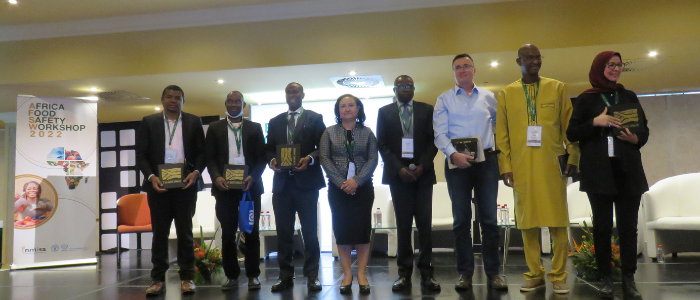
The National Metrology Institute of South Africa (NMISA) hosted the second Africa Food Safety Workshop in Johannesburg from 27 June to 1 July 2022 in collaboration with the Joint Food and Agricultural Organisation/IAEA Centre for Nuclear Techniques in Food and Agriculture, the IAEA Technical Cooperation Department, and the Africa Food Safety Network. Around 270 delegates from across Africa participated in the week-long workshop at Emperor’s Palace in Johannesburg. As part of the event, reliable analysis methods and inter-institutional cooperation were promoted to improve public health and food safety.
The week-long workshop, under the theme Joining Hands, To Ensure Food Safety for Africa, promoted knowledge exchange, know-how, and interpretation regarding food hazards and how to deal with the real issues relating to Intra-Africa trade. A continental discussion was held to discuss ways to strengthen national and regional food safety control systems to protect consumers and improve trade.
NMISA CEO Mr. Ndwakhulu Mukhufhi opened the first day of the workshop with an African proverb conceptualising an African stance: “If you want to go fast, go alone. If you want to go far, go together.” He emphasised that measurements would not be able to support products intended for trade without traceability.
According to Dr. Maria Fernandes-Whaley, Senior Manager of Analytical and Material Sciences at NMISA, the quote by Ndwakhulu was the golden thread that provided the essence of the conference this week; bringing the farm to the fork through analytical endeavors.
As participants shared their experiences, they explored how to ensure that all stakeholders and role-players participate in the decision-making process related to food safety and security. These included determining whether or not the food that we eat is safe and if consumers are getting the quality that they are paying for (especially on reduced budgets).
Maria explains: “All these decisions on whether or not something is safe to eat are based on the measurement results received from the laboratories. Many scientists and decision-makers from across Africa participated in this workshop to share the current status quo and to learn from each other. Discussions also included how to analyse for the major food hazards, including microbiological pathogens, mycotoxins, pesticide residues, heavy metals, and veterinary drug residues."
As commented by Maria: “There are regulations in place to ensure that all elements (as she refers to them, “the big five components”) are below a certain concentration level for safe human consumption. Testing laboratories must monitor maximum residue levels as outlined in regulatory frameworks for countries around the world. South Africa has had an issue with listeriosis because the pathogen levels were too high and testing methods were adapted to address this. These food hazards were discussed in detail on each day of the workshop and taken up as topics of discussion among the delegates.”
Scientific capacity building and accreditation was a key discussion topic during the workshop. Maria emphasised that accreditation refers to conformance with the international standard ISO/IEC 17025:2017 which describes the analytical requirements for the competency of testing and calibration laboratories. “If you are a testing laboratory testing food, there are certain analytical and testing requirements that are needed to be in place to be considered a competent testing laboratory.”
Food fraud
The topic of food fraud and how to detect it was highlighted during the workshop. Food fraud is considered severe in Africa and consumers are sometimes cheated when purchasing products (such as olive oil) that are made with sunflower oil and blended with other ingredients. Honey is another example of a commodity that is often fraudulently sold as a honey product when it is golden syrup and/or pure sugar. To be considered: “If you are paying very cheaply for your honey, you can suspect that it is syrup with a bit of flavoring.” This can also be applied to commodities such as whiskey, wine, and milk, to name just a few commodities that can be adulterated.
The importance of traceable testing cannot be overstated when it comes to ensuring food safety and security. A proactive approach and the ability to respond effectively before a problem arises are essential. An outcome from the workshop: “We need to ensure that everyone works together to ensure food safety across the continent by sharing knowledge, experiences, and mutual training to ensure that we can test correctly and are testing correctly,” Maria says.
About NMISA (The National Metrology Institute of South Africa)
NMISA is a member of the Department of Trade, Industry, and Competition’s (dtic) family and part of the technical infrastructure entities. The entity is tasked with the development, maintenance, and dissemination of measurement standards that assist South Africa in global trade and ensure that the country can react to food safety crises as they arise.
NMISA’s mission is to be the leading Metrology Centre of excellence on the African continent connecting Africa to the world. It aims to consistently deliver outstanding innovative and internationally comparable measurement solutions that support regional and international trade, people's quality of life, and enable the protection of the environment. NMISA is the producer of Reference Materials accredited to ISO 17034, and the provider of the ISO 17043 accredited Proficiency Testing Scheme.


.JPG)

